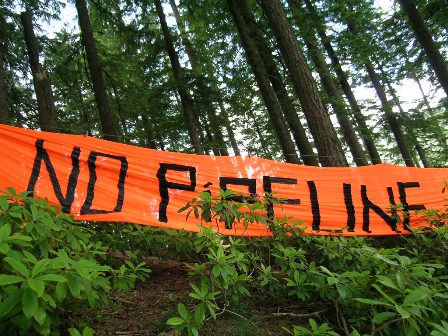The Oregonian: Pipeline across the Cascades could be in for more trouble with settlement
A settlement between environmental groups and federal agencies covering the development of energy corridors in the West could mean more trouble for Northwest Natural Gas Co.'s on-again-off-again quest to build a pipeline across the Cascades through Mt. Hood National Forest.

By Ted Sickinger, The Oregonian
A settlement between environmental groups and federal agencies covering the development of energy corridors in West could mean more trouble for Northwest Natural Gas Co.'s on-again-off-again quest to build a pipeline across the Cascades through Mt. Hood National Forest.
The settlement would revise a Bush-era plan under the 2005 Energy Policy Act to establish energy corridors across the West with streamlined regulatory approvals of transmission lines and pipelines.
Environmentalists sued the Department of Interior in U.S. District Court to block the plan in 2009. They argued the original designations didn't facilitate renewable energy development, failed to look at environmental consequences and provided insufficient protections for public lands within the designated corridors.
The settlement, if approved by the court, would force the Bureau of Land Management, the Forest Service and the Department of Energy to adopt a more rigorous process for approving corridors, consider access for renewables, look at options to avoid or reduce environmental impacts and provide more opportunities for public input.
The settlement would also force the agencies to reevaluate designated "corridors of concern," including one that traverses Mt. Hood National Forest. Environmerntalists have argued that Northwest Natural's plan to build the Palomar pipeline in that corridor would destroy mature and old-growth forest stands and cross streams and rivers that provide critical habitat for salmon.
Northwest Natural originally proposed Palomar to transport gas from a proposed liquefied natural gas terminal on the Columbia River. The LNG project was abandoned, but the gas company said it was still interested in building the eastern section of the line to provide an alternate supply route to ship gas from an interstate line in Central Oregon into the Willamette Valley.
The company withdrew its application last year and told regulators there was insufficient demand to support the project in the near term. But it insisted that the project wasn't dead, and that it would return with a revised proposal as soon as this year, this time in conjunction with Northwest Pipeline, which operates much of the gas transmission system in Oregon and Washington.
Olivia Schmidt, program director with Bark, a conservation group that has been fighting Palomar, said Tuesday that the settlement "should be the final nail in the coffin for that route" of Palomar. If Palomar were reintroduced with the same route, Bark said, the settlement would force the Forest Service to acknowledge that the route has very specific environmental concerns that make it less desirable for development than other routes. That doesn't mean it absolutely couldn't work, but raises the regulatory hurdles significantly.
NW Natural said it hadn't had a chance to evaluate the settlement.
"We don't have an application in right now," said company spokeswoman Claire Levine. "We'll be following the process."
-- Ted Sickinger
A settlement between environmental groups and federal agencies covering the development of energy corridors in West could mean more trouble for Northwest Natural Gas Co.'s on-again-off-again quest to build a pipeline across the Cascades through Mt. Hood National Forest.
The settlement would revise a Bush-era plan under the 2005 Energy Policy Act to establish energy corridors across the West with streamlined regulatory approvals of transmission lines and pipelines.
Environmentalists sued the Department of Interior in U.S. District Court to block the plan in 2009. They argued the original designations didn't facilitate renewable energy development, failed to look at environmental consequences and provided insufficient protections for public lands within the designated corridors.
The settlement, if approved by the court, would force the Bureau of Land Management, the Forest Service and the Department of Energy to adopt a more rigorous process for approving corridors, consider access for renewables, look at options to avoid or reduce environmental impacts and provide more opportunities for public input.
The settlement would also force the agencies to reevaluate designated "corridors of concern," including one that traverses Mt. Hood National Forest. Environmerntalists have argued that Northwest Natural's plan to build the Palomar pipeline in that corridor would destroy mature and old-growth forest stands and cross streams and rivers that provide critical habitat for salmon.
Northwest Natural originally proposed Palomar to transport gas from a proposed liquefied natural gas terminal on the Columbia River. The LNG project was abandoned, but the gas company said it was still interested in building the eastern section of the line to provide an alternate supply route to ship gas from an interstate line in Central Oregon into the Willamette Valley.
The company withdrew its application last year and told regulators there was insufficient demand to support the project in the near term. But it insisted that the project wasn't dead, and that it would return with a revised proposal as soon as this year, this time in conjunction with Northwest Pipeline, which operates much of the gas transmission system in Oregon and Washington.
Olivia Schmidt, program director with Bark, a conservation group that has been fighting Palomar, said Tuesday that the settlement "should be the final nail in the coffin for that route" of Palomar. If Palomar were reintroduced with the same route, Bark said, the settlement would force the Forest Service to acknowledge that the route has very specific environmental concerns that make it less desirable for development than other routes. That doesn't mean it absolutely couldn't work, but raises the regulatory hurdles significantly.
NW Natural said it hadn't had a chance to evaluate the settlement.
"We don't have an application in right now," said company spokeswoman Claire Levine. "We'll be following the process."
-- Ted Sickinger
More about Palomar LNG Pipeline...




